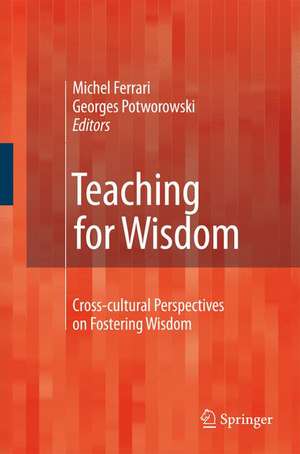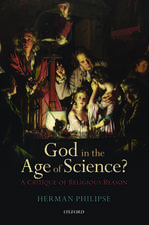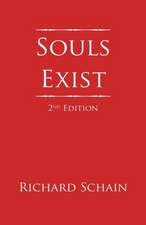Teaching for Wisdom: Cross-cultural Perspectives on Fostering Wisdom
Editat de Michel Ferrari, Georges Potworowskien Limba Engleză Hardback – 24 oct 2008
| Toate formatele și edițiile | Preț | Express |
|---|---|---|
| Paperback (1) | 638.11 lei 6-8 săpt. | |
| SPRINGER NETHERLANDS – 19 oct 2010 | 638.11 lei 6-8 săpt. | |
| Hardback (1) | 643.34 lei 6-8 săpt. | |
| SPRINGER NETHERLANDS – 24 oct 2008 | 643.34 lei 6-8 săpt. |
Preț: 643.34 lei
Preț vechi: 756.86 lei
-15% Nou
Puncte Express: 965
Preț estimativ în valută:
123.12€ • 128.37$ • 102.32£
123.12€ • 128.37$ • 102.32£
Carte tipărită la comandă
Livrare economică 21 martie-04 aprilie
Preluare comenzi: 021 569.72.76
Specificații
ISBN-13: 9781402065316
ISBN-10: 1402065310
Pagini: 248
Ilustrații: XII, 234 p.
Dimensiuni: 156 x 235 x 21 mm
Greutate: 0.5 kg
Ediția:2008
Editura: SPRINGER NETHERLANDS
Colecția Springer
Locul publicării:Dordrecht, Netherlands
ISBN-10: 1402065310
Pagini: 248
Ilustrații: XII, 234 p.
Dimensiuni: 156 x 235 x 21 mm
Greutate: 0.5 kg
Ediția:2008
Editura: SPRINGER NETHERLANDS
Colecția Springer
Locul publicării:Dordrecht, Netherlands
Public țintă
ResearchCuprins
Fostering Wisdom as Expertise.- Fostering Wisdom: A Psychological Perspective.- Teaching for Wisdom Through History: Infusing Wise Thinking Skills in the School Curriculum.- The Cultivation of Character Strengths.- Wisdom in Elementary School.- Master Zhu’s Wisdom.- Teaching for Wisdom as Personal Transformation.- Wisdom and Learning to Be Wise in Chinese Mahayana Buddhism.- Beginner’s Mind: Paths to the Wisdom that is Not Learned.- Ascending to Wisdom: A Christian Pedagogy.- Learning from Wise People.- The Wisdom of Plato’s Phaedo.- Can Wisdom Be Taught? Kant, Sage Philosophy, and Ethnographic Reflections from the Swahili Coast.- Conclusion.- Developing Expert and Transformative Wisdom: Can Either Be Taught in Public Schools?.- Sophia’s World: Episodes from the History of Wisdom.
Textul de pe ultima copertă
Wisdom is valued as an ideal aim of personal development around the world. But we rarely see how wisdom is understood in different religious and philosophical traditions and different scientific disciplines, and more particularly how wisdom is taught. The emphasis of the book is on whether wisdom can be taught, not on what wisdom is, making it both more practical and more personally engaging. More specifically, it considers how people at different times and places have engaged the age-old question of how (or whether) we can learn to live a good life, and what that life is like. The chapters in this book area welcome introduction to this vast field from a variety of different perspectives. Chapters consider Greek and Confucian philosophy, Christian, Islamic and Buddhist religion, African tradition, as well as contemporary scientific approaches to the study of wisdom. Authors of each chapter are leading scholars in their respective fields, and representing a range of disciplines including philosophy, psychology, anthropology, and religion. Chapters are written to be accessible to a broad audience, not specialists. The book hopes to open a dialogue between experts in various fields about the complex and fascinating topic of wisdom and how it is understood, both historically and personally as a transformative force within people’s lives.
Caracteristici
Emphasis of the book is on whether wisdom can be taught, not on what wisdom is Practical and personally engaging look at how people at different times and places have engaged the question of how we can learn to live a good life Gathers together a range of perspectives never before assembled within a single volume Includes scientific, philosophical, and religious perspectives on wisdom usually considered separately














